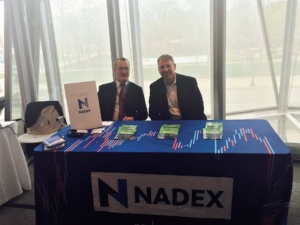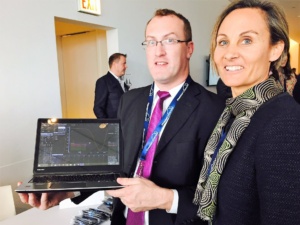Bringing futures into the hands of retail traders. Is Chicago within the reach of the retail set? – Op Ed
Here in Chicago, the world’s listed derivatives heartlands, retail trading has been in the sights of the large professional trading platform and multi-asset derivatives executives. How will it pan out? Will IG and GAIN be the dominant forces in North America’s top quality trading environment, or will Chicago’s finest be able to show their competitive edge?

It is worthy of some degree of thought to consider how the MetaTrader 4 platform has been adapted in order to maintain pace with the ever-demanding requirements of retail traders across the world. Its origins as a closed system with fixed spreads which was connected to an internal dealing room became completely obsolete very quickly.
With new retail-focused initiatives from exchange technology companies and their associated platform providers, the evolution may well go beyond the ubiquitous platform of choice among retail customers.
An interesting dichotomy here is the predilection for CFDs that had prevailed over the past two years.
Following the Swiss National Bank’s removal of the 1.20 peg on the EURCHF pair, causing massive and unprecedented market volatility, some brokerages looked toward the expansion of their range of CFDs as a means of offsetting the risk of being exposed to negative client balances that spot FX created.
This seemed an unusual step to take, because CFDs are very difficult to clear, the spreads are wide, especially on non-FX products, and in certain jurisdictions, a ban on CFD trading may take place.

With exchange-traded futures contracts, the spreads are lower, and the market depth can be viewed in many cases up to 20 pricing levels which is the default among many electronic exchanges.
Dedicated platform providers are also going down this route.
Chicago based GX2 Systems provides a platform which executes spreads and provides traders with a means of conducting alpha generation, just as would be used by employees of proprietary trading desks. The platform executes spreads of multiproduct, customized, relative value spread relationships at the limit price of the spread level, and does not leg the spreads.
According to the company, GX2 is not a traditional independent software vendor (ISV), and is a platform comprised of a trading desk, execution algorithms and risk management.
The functionality allows actionable prices on customized spreads, baskets, or strategies. With GX2, users no longer have to worry about colocation costs or infrastructure costs and can manage their own limit order book whilst trading on a cross-venue, cross-asset class spreading basis.
As retail traders began to become more sophisticated and gain a much fuller understanding of the FX business, emulation of the non-bank institutional trading modus operandi ensued.
With variable spreads being demanded and direct market access via aggregated liquidity and the rise of bridge providers which engineered software to adapt the MetaTrader 4 platform to be connected to a live market.
Keeping the familiarity and compatibility with third party software such as EAs (expert advisers) that MetaTrader 4 has always been popular for, but whilst providing the direct access to the point that the vast majority of prime brokerages today are providing live, aggregated bank liquidity via highly advanced aggregation
systems to MetaTrader 4 brokerages.
In conclusion, it is now very clear that the retail FX industry is in the sights of the large institutions and the ecosystem that has built itself up around Chicago’s finest, and whilst the approach is not as first may have been anticipated, it is most certainly very much a reality.

Canada’s ecosystem echoes that line of thinking, however overseas clients are able to do business in Canada and vice versa. OANDA Corporation, whilst a Canadian company, conducts most of its business in the United States, and Toronto, North America’s third largest financial center after New York and Chicago, is steeped in a tradition of equities trading, therefore does not have a large FX industry. Regulation in Canada is on a provincial basis, and is in the shadows of the giants of the US.
With the imminent re-entry to the United States retail market by IG Group, one of the world’s most long established, financially and commercially stable OTC derivatives companies, there is a great division appearing in what is widely regarded as being the most well organized electronic trading region in the world.
IG Group’s imminent rennaissance in North America signals a reinforcement of FinanceFeeds long held perspective that now is the time to head back to the United States to provide standard spot FX via a proprietary platform with the backing of a well capitalized and publcily listed company.
By the end of last year, IG Group had achieved an annual revenue of £487.9 million, and is listed on the London Stock Exchange’s main market, having a market capitalization of £2.49 billion.
Considering the consolidation of the retail FX sector globally, largely concerning firms that have been only established since the dawn of MetaTrader 4, which gave rise to several almost identical, small firms, along with the increasing overt competition, IG stands proud, with today’s client base being represented in its own land by around 50% of global business, having managed to go from strength to strength internationally in important regions for the retail sector including Australia and the APAC region.
A steady and strong corporate progression is clear from IG Group’s continual growth, however an area which the firm has retracted from, along with many retail FX brokerages in what can only be described as a mass exodus, is the United States of America.
This massive 30 year success can be attribited to its spot FX product range, and not its listed binary options business NADEX which has remained its only North American congingent until now. The decision to enter the US as a fully fledged retail FX business is one that we applaud and recently, in a meeting in Chicago between FinanceFeeds and a selection of senior listed derivatives executives, it was stated “We welcome IG Group back to America with open arms.”
The need for this is clear, especially as floundering OANDA Corporation, one of only two market participants in the United States alongside tower of strength GAIN Capital, has demonstrated that it really is no competition for those with solid commercial backbones.

OANDA Corporation has been the subject of an agreement to sell its entire operations to CVC Capital, subsequently preparing itself for cryptocurrency trading in Asia, and has spent the last few years chopping and changing its direction as often as its senior management and has undergone some very difficult corporate tidal waves such as the fiasco which involved the development of its own social trading system fxUnity before canning it six months later, then subsequently buying ailing social trading network Currensee for several million dollars, before that went West also.
Being lone rangers in a market so well organized as the United States and with such a good quality, long standing and loyal client base and then getting it wrong is anathema.
Thus, the OTC giants of North America will be GAIN Capital and IG Group for the meantime.
The interesting matter to consider is that of how close to attractive retail offerings the derivatives sector is, especially after CQG has been integrating its liquidity connectivity solution into MetaTrader so that the ubiquitous MT4 platform can provide listed derivatives exchange access as well as spot FX, and after CBOE LIVEVOL launched its retail-orientated Amazon-style new site two years ago, previewed in its homeland of Chicago by FinanceFeeds.
Trading Technologies is also courting the retail trader, as has been Cantor Fitzgerald with its Cantor Futures Exchange for some time, offering exchange traded fixed odds options which have been equally quiet.
This week, FinanceFeeds is in Chicago, and will be gathering substantial information from within the boardrooms of the leaders of the futures industry to see how far this progress has come.
Image: State Street, Chicago, Illinois. Copyright FinanceFeeds









